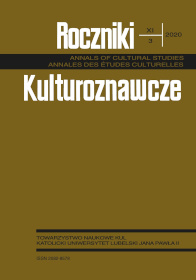Covid-19 and the Future of Western Civilisation
Abstrakt
Covid-19 a przyszłość cywilizacji zachodniej
Cywilizacja jest pod wieloma względami apoteozą ludzkiego impulsu społecznego, dobrego i złego, a cokolwiek się stanie, era koronawirusa głęboko ukształtuje zachodnią wersję tej wspólnej kultury. W artykule omówiono sposób, w jaki społeczność ludzka ukształtowała ludzkie choroby i vice versa, a także przedstawia trzy wyidealizowane możliwe wersje przyszłości cywilizacji zachodniej, które mogą być efektem Covid-19.
Bibliografia
Barnes, Ethne. Diseases and Human Evolution. Albuquerque: University of New Mexico Press, 2005.
Blevins, Steve M., and Michael S. Bronze. “Robert Koch and the ‘Golden Age’ of Bacteriology.” International Journal of Infectious Diseases 14 (2010), issue 9: e744-e751. DOI: https://doi.org/10.1016/j.ijid.2009.12.003.
Burgess, Katie. “National Cabinet rejects elimination strategy.” Canberra Times. July 24, 2020
Collinge, Sharon, and Chris Ray. Disease Ecology: Community Structure and Pathogen Dynamics. Oxford: Oxford University Press, 2006.
Davis, Mike. Late Victorian Holocausts: El Niño Famines and the Making of the Third World. London & Brooklyn, NY: Verso Books, 2002.
Dubos, René Jules. Mirage of Health: Utopias, Progress and Biological Change. New Brunswick, NJ: Rutgers University Press, 1987.
Elias, Norbert. “Technization and Civilization.” Theory, Culture & Society 12 (1995), issue 3 : 7–42. DOI: https://doi.org/10.1177/026327695012003002
Elias, Norbert. The Civilizing Process. Sociogenetic and Psychogenetic Investigations. Revised edition. Oxford: Blackwell, 2000.
Freud, Sigmund. Civilization and its Discontents. Translated by James Strachey. Peterborough: Broadview Press, 2015.
Hamlin, Christopher, and Pat Sidley. “Revolutions in public health: 1848, and 1998?” Bmj 317 (1998), no. 7158: 587–591.DOI: https://doi.org/10.1136/bmj.317.7158.587.
Harper, Kyle. The Fate of Rome: Climate, Disease and the End of an Empire. Princeton: Princeton University Press, 2017.
Huntington, Samuel. “The Clash of Civilizations?” Foreign Affairs 72.3 (Summer, 1993): 22–49.
Karlen, Arno. Plague’s Progress: A Social History of Disease. London: Gollancz, 1995.
Longmate, Norman. King Cholera: The Biography of a Disease. London: Hamish Hamilton, 1966.
McMichael, Anthony J. “Environmental and Social Influences on Emerging Infectious Diseases: Past, Present and Future.” Philosophical Transactions of the Royal Society of London. Series B: Biological Sciences 359 (2004), no. 1447: 1049–1058.
Pinker, Steven. The Better Angels of Our Nature: Why Violence has Declined. New York: Penguin Group USA, 2012.
Porta, Miquel (ed.). A Dictionary of Epidemiology (5th edition). Oxford: Oxford University Press, 2009.
Snowden, Frank. Epidemics and Society: From the Black Death to the Present. New Haven, CT: Yale University Press, 2019.
Stathakopoulos, Dionysios. Famine and Pestilence in the Late Roman and Early Byzantine Empire. Aldershot: Ashgate, 2004.
Summers, Jesse, and Samuel Litwin. “Examining the Theory of Error Catastrophe.” Journal of Virology 80 (2006), no 1: 20-6. DOI: 10.1128/JVI.80.1.20-26.2006
Torrey, E. Fuller, and Robert H. Yolken. Beasts of the Earth: Animals, Humans and Disease. New Brunswick, NJ: Rutgers University Press, 2005.
Watts, Sheldon. Epidemics and History. New Haven, CT: Yale University Press, 1997.





